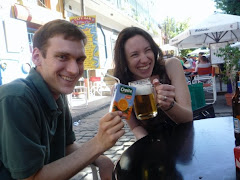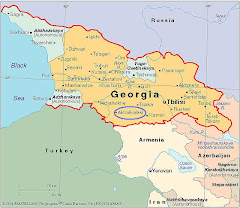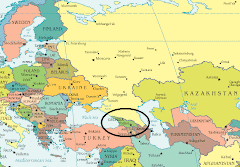In the past two weeks, we entirely finished up our summer camp duties. We went back to the summer camp we had been working with for two extra days (on top of the 12 we had already worked) to "rehearse" a few English-language songs we had worked on with the kids so they could perform them for the final day of camp's big blowout concert/talent show.
Campers waiting for the talent show to begin

During our previous 12 days of camp we had sung Old MacDonald (they loved choosing animals that don't make recognizable sounds, like foxes and deer) and If You're Happy and You Know It.
Sam, leading a rousing rendition of Old MacDonald

We also played some games with The Beatles' Hello, Goodbye. Another big hit was that we taught them the chorus of the K'naan song Wavin' Flag (we sang the World Cup theme version, which they all knew from watching the World Cup, not the original version, which is much better). Last, but certainly not least, we frequently played/sang Johnny Works with One Hammer. (Sadly, and by tremendous oversight, we did not get a video of this. You say/sing "Johnny works with one hammer, one hammer, one hammer, Johnny works with one hammer, now he works with two" up to 5 hammers. While singing, you pump your fist as if you are working with a hammer. You add your other fist for 2, stomp one foot and then the other for 3 and 4 and then add some head banging for 5. After a few go-throughs, the kids are whiplashed and exhausted, so this is an all-around great activity. I'm sure we'll get a video of it at some point in our 2 years here.)
Sadly, I only have a picture of Johnny Works with One Hammer

We spent two days going over these songs again and they kids chose to perform Old MacDonald and Wavin' Flag at the concert. It was a great success.
After our big summer camp was over, I headed to a different minority community in Georgia, the Azerbaijani village of Kharajalar, where fellow volunteer Kelsey will be spending her next two years. She was running her summer camp and I went to help out for two days. Kelsey was with us in Kortaneti during training; they put all of the volunteers who would be serving in minority areas together because our learning of three languages necessitated a weird language schedule and it made sense for us all to stick together. Kelsey's ingenious idea for keeping her campers occupied was to make them race back and forth in pairs, holding a balloon between their heads (no hands!) and answer English questions when they got to the end. It was fantastic.
Making English learning as amusing as possible for the teacher

Kelsey's village is only about a stone's throw from Tbilisi, so we headed into the capital on the weekend. We also visited some other volunteers in another big city not far from Tbilisi, Rustavi. You might remember some of our pictures of Rustavi from our trip there in June (Soviet blocs of apartments, as far as the eye can see!). The most exciting part of the weekend (or at least the part that came closest to making us all cry for laughing so hard) was when we inadvertently ordered 20 hot dogs. Who knew that asking for 5 hot dogs (one each) would instead yield 20?
I think we're probably all still belching

After returning from Kelsey's camp and the capital 4 hot dogs heavier (and believe me, I felt those 4 hot dogs), Sam and I launched into our final summer camp of the year. We had had requests from many of the older students we'd come across for a chance for them to practice English with us (the town's camp was only for students aged 9-14). We held a 3-day mini-camp last week, Monday through Wednesday, at the town's administration building to comply with these requests. On day one, we talked with the students (about 20 in all, mostly girls). We played a lot of speaking games to encourage them to get over any anxiety or shyness about speaking in front of one another and it went really well. We were really impressed at how well the kids could express themselves in English.
On the second day, we listened to a lot of English-language music (everything from U2 to Outkast, Bob Marley to Bob Dylan, Louis Armstrong to System of a Down). We had the students fill out some worksheets we had created: fill in the blanks with song lyrics, circle the correct song lyrics, match the idiom with the meaning. They did really well with this, too, and really got into it. (On a side note, the Armenian-American band System of a Down is extremely popular here in our Armenian community. We were initially really excited to find a universally loved band, thinking "Great! We can use their songs to teach English!" Then we realized that this is one of their most popular songs here. So much for teaching English...)
The third and final day was movie-watching day, and as we did in Kortaneti, we showed Finding Nemo. Since these kids were older and had a better grasp of English, we asked them to write down words they heard but didn't know, as well as the names of as many characters as they could. When we paused the movie at 15-minute (or so) intervals to discuss what had gone on thus far, we were able to talk about some of the jokes-for-adults and cultural references that were entirely above the level of the younger kids we showed it to previously. They really enjoyed it and, impressively, all sat captivated by it, diligently taking notes and asking questions at each break.
When this camp ended, we had a lot of requests for renewed sessions or get-togethers in the future. We do hope to form a conversation club or after-school English group once we get into the swing of things with the school year, and it was really encouraging to hear so many students requesting it.
So now we are totally done summer camp and gearing up for the start of the school year. The first day of school is September 15, but most teachers are starting to trickle back now, to work on preparing their curricula and figure out what their schedules will be. I went in to my school today and met lots teachers (I'm getting really good at recognizing faces, but am still abysmally bad at remembering names). Sam will go in to his school tomorrow. Then, before we know it, we'll be in the daily grind and teaching classes.








